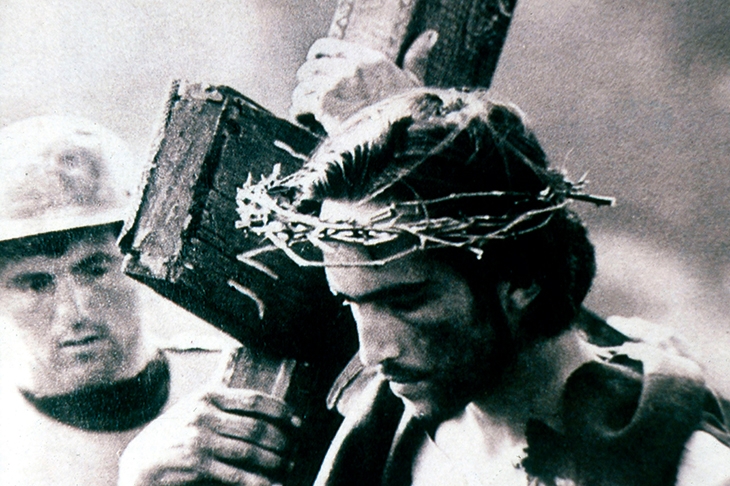The Italian film director Federico Fellini was not known for his piety (far from it), yet towards the end of his life in around 1990 he determined to film Dante’s Inferno for national television. The brimstone poem appealed to Fellini for its comico-grotesque scenes of mass writhing human nudity amid firecracker detonations.
He was not the first filmmaker to take on the work of the medieval Florentine poet. In the early 1970s, Fellini’s compatriot Franco Zeffirelli persuaded Dustin Hoffman to star as Dante Alighieri in his own version of the Inferno. Hoffman, dressed in a medieval coif hat and Tootsie-red robe, was supposed to wander through a sulphurous underworld accompanied by the Latin poet Virgil. Nothing came of either Zeffirelli’s or Fellini’s Inferno. For both directors, though, Dante was the pre-eminent writer of pre-Reformation Europe, whose three-part journey through hell, purgatory and paradise, The Divine Comedy, combined a Christian vision of redemption with classical Latin erudition.
In this superb cultural history, Mark Le Fanu considers the religious impulse that distinguishes so much European cinema in its golden age from the second world war up to the 1980s. Ours may now be a secular world, yet it is ‘impossible to escape’ from our religious heritage, says Le Fanu. Images of Christianity are poetically allied in his adored European directors to images of secular modernity. Fellini himself viewed Rome as a lasagna-like palimpsest of Christian histories and archaeologies waiting to be revealed on celluloid. He co-wrote the script for Robert Rossellini’s 1950 film about St Francis of Assisi, Flowers of St Francis, a work of roughshod humanity which Martin Scorsese, for one, reveres. ‘I find it hard to put into words why I find the film so charming,’ Le Fanu admits.
Andrei Tarkovosky’s Russian cinema radiates a sense of religious mystery. Some of the shots in his celebrated 1979 film Stalker last up to seven minutes. Though beautiful, the images of disused chemical factories and silted urban waterways seem to cry out for exegesis. Contemporary pop-promo directors like Guy Ritchie and Danny Boyle must find Tarkovsky a bit of a bore. The grasshopper attention span demanded of most cinema-goers these days is antipathetic to masterworks by Tarkovsky such as Solaris (the re-make with George Clooney was no good) and Andrei Rublev. For Le Fanu, though, Tarkovsky remains the ‘most important modern Christian filmmaker’ of our time, whose Russian Orthodox faith suffused his cinema with an icon-like poetic stillness.
Pier Paolo Pasolini is another whose filmography appears to be fraught with portents of death and the mystery of life after death. At the end of Mamma Roma (1962), starring Anna Magnani, the young working-class hero lies dying on a prison bed like a Christ foreshortened by Mantegna. In some ways, Le Fanu suggests, the experience of cinema became a substitute for pious church-going. Pasolini’s magnificent 1963 film The Gospel According to Matthew (the word ‘saint’ was pointedly omitted from the title) radiates a fierce pauperist Catholicism, and is arguably one of the greatest religious films ever made.
Le Fanu, a renowned film critic and Tarkovsky’s biographer who teaches at University College, London, has unearthed some little-known marvels for this book. Curzio Malaparte’s 1951 The Forbidden Christ, ‘one of the strangest and most powerful Christian movies on record’, unfolds at the war’s end in a remote Tuscan town hedged in by centuries of custom and sorrow. A demobbed Fascist soldier returns there with vendetta on his mind, only to embrace a Christian vision of forgiveness. How so? As a pro-Fascist journalist, Malaparte had visited the Warsaw ghetto in the winter of 1942, but was only able to express his uncensored impressions of death and over-crowding in occupied Europe in his post-war novel Kaputt, and perhaps also, subliminally, in his one and only film, where the shadow of the Hitlerite conflict is never far away. Le Fanu extols Malarparte as a cineaste manqué, who was susceptible to stories of mystery and grace.
A book to treasure, Believing in Film considers Ingmar Bergman, Robert Bresson, Andrzej Wajda, Luis Buñuel and other religiously-minded directors who, in their different ways, gave the lie to claims that materialist science was carrying all before it. Exemplary is the 1958 Buñuel film Nazarin, which tells of a fundamentalist Catholic priest who attempts to take the Gospel all too literally. Certainty is the opposite of thinking — Buñuel was certain of it — yet the film is suffused with a sense of darkness and resignation that one might profitably term religious. Le Fanu’s wonderful survey, with its aphoristic grace and erudition lightly worn, is from start to finish a delight to read.






Comments